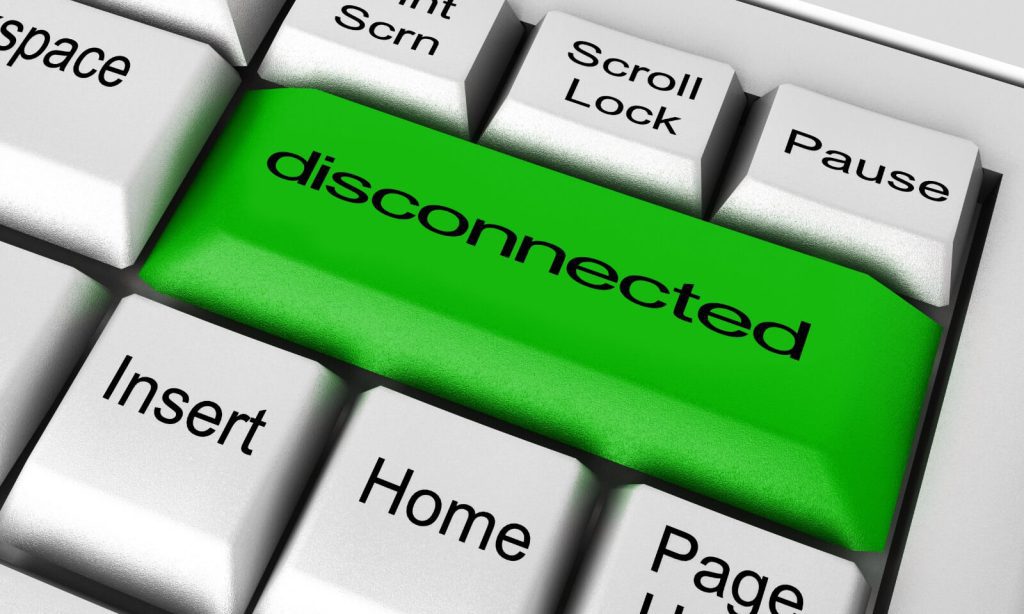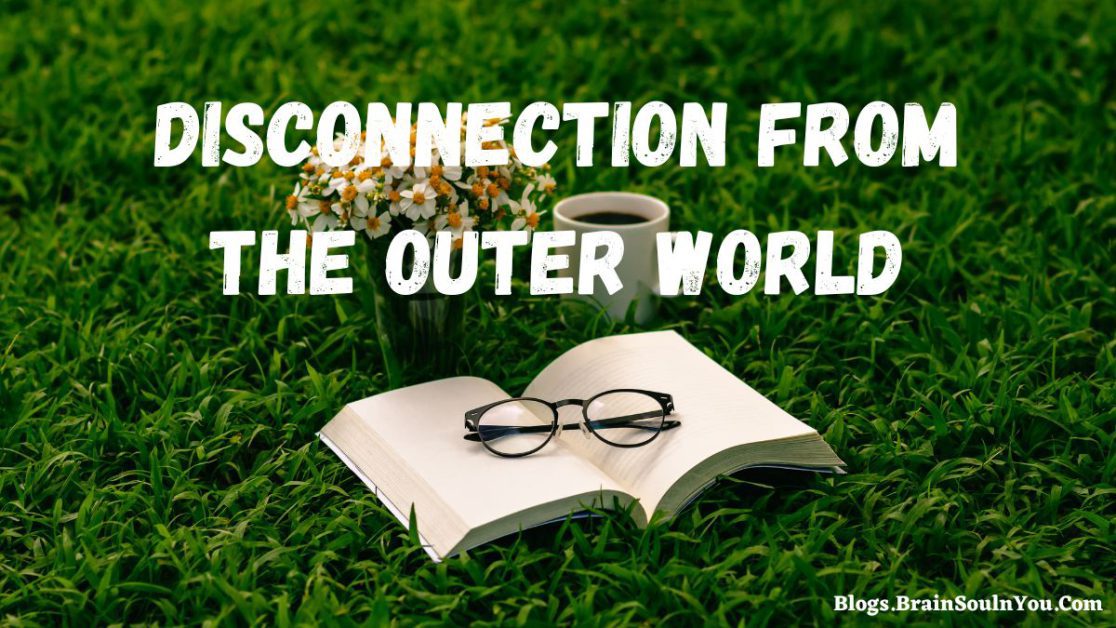Disconnection with outer world refers to a state where individuals experience a lack of connection or engagement with the external environment, including other people, nature, or social interactions. This disconnection can have various causes and impacts on individuals’ well-being.
Factors and Consequences Associated with Disconnection
Here are a few factors and consequences associated with disconnection from the outer world:
Digital Distractions: In the age of technology, excessive reliance on digital devices and online platforms can contribute to disconnection. Spending excessive time on screens, social media, or virtual interactions may result in reduced face-to-face social connections and a diminished sense of presence in the physical world.
Social Isolation: A lack of social interaction or a feeling of being disconnected from others can lead to social isolation. This can occur due to factors such as geographic distance, lack of social support networks, or a lack of opportunities for meaningful connections. Social isolation can have negative effects on mental health, leading to feelings of loneliness, depression, and decreased overall well-being.
Nature Deficit: Disconnection from the natural world, also known as “nature deficit,” can occur when individuals spend little time outdoors or have limited exposure to natural environments. This disconnection from nature can have adverse effects on physical and mental health, including increased stress levels, reduced cognitive functioning, and decreased overall satisfaction with life.
Impact on Well-Being: Disconnection from the outer world can negatively impact overall well-being. Human beings have an inherent need for connection, both with other people and with the natural environment. Lack of connection can result in feelings of emptiness, disengagement, and a diminished sense of purpose or meaning in life.
Reduced Empathy and Understanding: Disconnection from the outer world can hinder individuals’ ability to empathize and understand the experiences and perspectives of others. Without exposure to diverse viewpoints and interactions, individuals may become more self-focused and less aware of the needs and experiences of those around them.
To address disconnection with the outer world, it is important to prioritize meaningful social interactions, allocate time for activities in nature, and establish a healthy balance between online and offline engagement. Building and nurturing relationships, seeking opportunities for community involvement, and engaging in activities that promote connection with nature can help alleviate the effects of disconnection and enhance overall well-being.
Why Disconnection Needed?
Most the thoughts that come into our mind daily, 95%, of thoughts are the previous day’s Thoughts and 95% of thoughts are negative thoughts. By this, our life becomes so monotonous and full of tension and anxiety. That’s why people are so depressed these days.
To overcome these problems and disconnection with past thoughts we need to disconnect with the outer world. Because the negativity of the outer world is diluting our thoughts.

For example: if we add water to milk. It’s difficult to separate water from milk. But if we make butter and mix it with water, butter will float in water and we can separate it from water easily.
Same we start doing meditation and start to feel ourselves, it will work like making butter from milk. After this we go into the outer world their negativity will not dilute our thoughts and will not affect us.
10 Impacts of Disconnection with Outer World
1. Social Isolation: Disconnection from the outer world can lead to social isolation, where individuals lack meaningful social interactions and experience feelings of loneliness.
2. Reduced Empathy: Lack of exposure to diverse perspectives and experiences can diminish empathy, making it harder for individuals to understand and relate to others.
3. Declining Mental Health: Disconnection from the outer world can contribute to poor mental health, including increased rates of depression, anxiety, and stress.
4. Diminished Sense of Belonging: Feeling disconnected can erode a sense of belonging and connectedness to the community, leading to a sense of alienation and detachment.
5. Reduced Productivity: Disconnection can hinder productivity by limiting collaboration, inspiration, and motivation that often arise from engaging with the external world.
6. Declining Physical Health: Lack of connection with the outer world, particularly nature, can impact physical health, including reduced physical activity and exposure to fresh air and sunlight.
7. Limited Personal Growth: The outer world offers opportunities for learning, personal development, and new experiences. Disconnection can impede personal growth and limit exposure to diverse ideas and knowledge.
8. Impaired Communication Skills: Lack of regular social interactions can hinder the development of effective communication skills, making it challenging to connect and express oneself with others.
9. Reduced Resilience: Disconnection from the outer world can weaken resilience, making it harder to cope with challenges and adapt to changing circumstances.
10. Decreased Sense of Wonder: Disconnection can lead to a diminished sense of awe and wonder that comes from engaging with the beauty, diversity, and complexity of the outer world.
It is important to recognize the impact of disconnection from the outer world and take proactive steps to foster meaningful connections, engage with the community, and prioritize personal well-being.
Way to Unplugging from the Outer World
Unplugging from the outer world and taking intentional breaks from the digital realm can have numerous benefits for mental well-being and overall balance. Here are some ways to unplug and disconnect from the outer world:
Set boundaries: Establish specific timeframes or periods throughout the day when you intentionally disconnect from electronic devices, social media, and online platforms.
Designate tech-free zones: Create designated areas in your living space, such as bedrooms or dining areas, where electronic devices are not allowed. This encourages offline activities and quality interactions with others.
Practice digital detox: Consider taking regular breaks from technology, such as weekends or vacations, where you minimize or eliminate the use of electronic devices altogether.
Engage in Offline Activities: Dedicate time to engage in activities that don’t involve screens, such as reading books, pursuing hobbies, exercising, spending time in nature, or engaging in face-to-face social interactions.

Establish a mindful morning and evening routine: Start and end your day without immediately reaching for your phone or other devices. Use these times for reflection, journaling, meditation, or engaging in calming activities.
Prioritize Self-Care: Dedicate time for self-care activities that promote relaxation, such as taking a bath, practicing mindfulness or yoga, or simply enjoying moments of solitude.
Connect with Nature: Spend time outdoors and immerse yourself in nature. Take walks, go hiking, or simply sit and observe the beauty of the natural world around you.
Nurture face-to-face interactions: Prioritize spending quality time with loved ones and engaging in meaningful conversations without the distraction of screens. Plan activities or outings where electronic devices are not the focus.
Find alternative sources of entertainment: Explore non-digital forms of entertainment, such as reading books, playing musical instruments, creating art, or participating in sports and physical activities.
Practice moderation and mindful usage: When you do use technology, be mindful of your usage patterns. Set limits on screen time, disable notifications, and choose to engage in activities that add value and meaning to your life rather than mindlessly scrolling.
Love,
Saurabh Goel
Saurabh Goel
He is the Founder and CEO of the Training and Counselling Company ‘Brain Soul & You’. He is an NLP Wellness Coach, Life Coach, Brain analyst, and Trainer for Education, Corporate, and Entrepreneurship. For more than 7 years, he delivered presentations on entrepreneurship, mind programming, and motivation. He did his B.tech in IT and later choose to be a successful psychologist. He is helping people in various ways through his counseling and training sessions.


